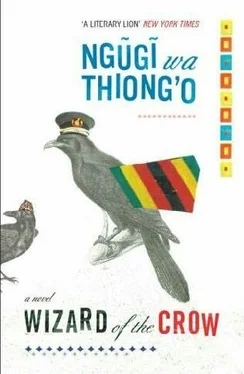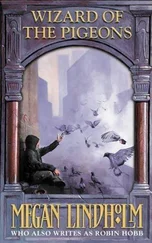
Ngũgĩ wa Thiong'o
Wizard of the Crow
Copyright © 2006 by Ngügi waThiong’o
A translation from Gikuyu by the author
This book is dedicated to my late parents
Wanjikü wa Thiong’o
Thiong’o wa Ndücü
&
to my wife,
Njeeri wa Ngügl,
for your love, courage, strength, and support
In the spirit of the dead, the living, and the unborn,
Empty your ears of all impurities, o listener,
That you may hear my story
There were many theories about the strange illness of the second Ruler of the Free Republic of Aburiria, but the most frequent on people’s lips were five.
The illness, so claimed the first, was born of anger that once welled up inside him; and he was so conscious of the danger it posed to his well-being that he tried all he could to rid himself of it by belching after every meal, sometimes counting from one to ten, and other times chanting ka ke ki ko ku aloud. Why these particular syllables, nobody could tell. Still, they conceded that the Ruler had a point. Just as offensive gases of the constipated need to be expelled, thus easing the burden on the tummy, anger in a person also needs a way out to ease the burden on the heart. This Ruler’s anger, however, would not go away, and it continued simmering inside till it consumed his heart. This is believed to be the source of the Aburirian saying that ire is more corrosive than fire, for it once eroded the soul of a Ruler.
But when did this anger take root? When snakes first appeared on the national scene? When water in the bowels of the earth turned bitter? Or when he visited America and failed to land an interview with Global Network News on its famous program Meet the Global Mighty} It is said that when he was told that he could not be granted even a minute on the air, he could hardly believe his ears or even understand what they were talking about, knowing that in his country he was always on TV; his every moment-eating, shitting, sneezing, or blowing his nose-captured on camera. Even his yawns were news because, whether triggered by boredom, fatigue, hunger, or thirst, they were often followed by some national drama: his enemies were lashed in the public square with a sjambok, whole villages were blown to bits or people were pierced to death by a bows-and-arrows squad, their carcasses left in the open as food for hyenas and vultures.
It is said that he was especially skillful in creating and nursing conflicts among Aburlrian families, for scenes of sorrow were what assuaged him and made him sleep soundly. But nothing, it seemed, would now temper his anger.
Could anger, however deeply felt, cause a mystery illness that defied all logic and medical expertise?
The second theory was that the illness was a curse from the cry of a wronged he-goat. It is said that some elders, deeply troubled by the sight of blood flooding the land, decided to treat this evil as they had epidemics that threatened the survival of the community in the olden days: but instead of burying the evil inside the belly of a beast by inserting flies, standing for the epidemic, into its anus, they would insert the Ruler’s hair, standing for the evil, into the belly of a he-goat through its mouth. The evil-carrying goat, standing for the Ruler, would then become an outcast in the land, to be driven out of any region where its cry announced its evil presence.
Led by a medicine man, they mixed the hair, obtained secretly from the Ruler’s barber, with grass, salt, and magic potions and gave it to the goat to swallow. Needle and thread in hand, the medicine man started sewing the seven orifices of the body beginning with the anus. The struggling he-goat gave out a bloodcurdling cry and, before the medicine man could seal its mouth, it escaped. It is said that it cried grief across the land, until the Ruler heard the cry and, learning about the curse, which he imagined to be a call for a coup, sent soldiers to hunt down the he-goat and all involved. Rumor has it that the goat, the barber, the medicine man, the elders, and even the soldiers were given over to the crocodiles of the Red River to ensure eternal silence about the curse. And it was to mark this day of his deliverance that the Ruler had the picture of the Red River added to Burl notes, the only picture besides his own to honor the Aburlrian currency.
Still, he worried about the fact that the goat had a beard, and he secretly consulted an oracle in a neighboring country, who assured him that only a bearded spirit could seriously threaten his rule. Though he read this as meaning that no human could overthrow him, for, since they had no bodily form, spirits could never grow beards, he became sensitive to beards and then decreed what came to be known as the Law of the Beard, that all goats and humans must have their beards shaved off.
There are some who dispute the story of the bearded he-goat and even argue that the Law of the Beard applied only to soldiers, policemen, civil servants, and politicians, and that the herdsmen shaved their he-goats out of their own volition, shaving goats’ beards then being the fashion among Aburlrian herdsmen.
These skeptics wondered: what has the cry of a he-goat whose anus, ears, and nose being sealed, have to do with the strange illness that befell the Ruler?
Others now came up with a third theory, which said that since nothing lasts forever, the illness had something to do with the aging of his rule: he had sat on the throne so long that even he could not remember when his reign began. His rule had no beginning and no end; and judging from the facts one may well believe the claim. Children had been born and had given birth to others and those others to others and so on, and his rule had survived all the generations. So that when some people heard that before him there had been a first Ruler, preceded by a succession of governors and sultans all the way from the eras of the Arabs, the Turks, the Italians, to that of the British, they would simply shake their heads in disbelief saying, no, no, those are just the tales of a daydreamer: Aburiria had never had and could never have another ruler, because had not this man’s reign begun before the world began and would end only after the world has ended? Although even that surmise was shot through with doubts, for how can the world come to an end?
The fourth theory asserted that his illness had its origins in all the tears, unshed, that Rachael, his legal wife, had locked up inside her soul after her fall from his grace.
The Ruler and his wife had fallen out one day when Rachael asked questions about the schoolgirls who, rumors claimed, were often invited to the State House to make his bed, where he, like the aging white man of the popular saying, fed on spring chicken. Of course, the Ruler would never admit to aging, but he had no problems with the “white man” comparison, and so he amended the proverb to say that a white man renews his youth with spring chicken. Imagine how he must have felt about Rachael’s attempt to deny him his fountains of youth! How indiscreet and indecorous of her to ask the unaskable! Since when could a male, let alone a Ruler, be denied the right to feel his way around women’s thighs, whether other men’s wives or schoolgirls? What figure of a Ruler would he cut were he to renounce his right to husband all women in the land in the manner of the lords of Old Europe, whose droits de seigneur gave them the right to every bride-to-be?
Читать дальше













